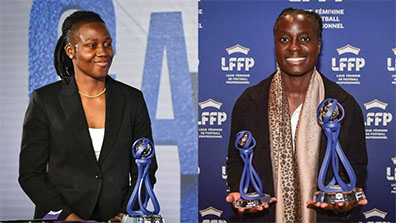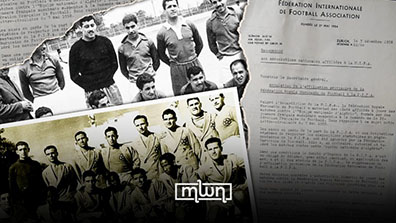International Football
Nigeria, African Teams Hold Confederations Cup Records
BY KUNLE SOLAJA.
Besides Cameroon, though in tragic circumstances getting to the final of FIFA Confederations Cup, African teams may not have made great impact, yet they find themselves in the competition’s record books.
Sports Village Square had earlier reported that until last Saturday when Russia beat New Zealand 2-0, Nigeria’s late Amodu Shaibu was the youngest coach at 36 years and 263 days to have guided a team at the competition.
New Zealand’s Anthony Hudson at 36 years and 96 days has now rested the record in the 0-2 loss to Russia on Saturday.
But if it is considered that Nigeria won its opening match of the 1995 competition when Super Eagles beat Japan 3-0, Amodu then remains the youngest coach to have won a FIFA Confederation match!
Sports Village Square recalls Nigeria’s Nnamdi Oduamadi becoming the first African to score a hat trick when the Super Eagles beat Tahiti 6-1 at the Brazil 2013 edition in Belo Horizonte. It could also be added that a match involving Nigeria also featured the oldest scorer in Confederations Cup.
When on June 20, 2013 Nigeria lost 1-2 to Uruguay in Salvador, Brazil, Uruguay’s Diego at age 34 years and 32 days beat the record of oldest scorer in the competition by just four day after Italy’s Andrea Pirlo had earlier set the record.
Both Pirlo and Forlan were born on the same date, but Forlan scoring four days after Pirlo’s gave him the edge. Coincidentally, it was also Forlan’s 100th match.
There are still more African influences in the Confederations Cup. When on this day, June 18 in 2005, Tunisia took on Germany, Tunisia’s goalkeeper; Ali Boumnijel became the oldest player in the history of the FIFA Confederations Cup. He was 39 years and two months.
On this same day eight years ago, the match involving Egypt became the 100th match in the history of the FIFA Confederation Cup. Egypt won the milestone match, 1-0 against Italy thereby becoming the first African team to defeat Italy (the second team to do so were Côte d’Ivoire in 2010).
International Football
Nigeria’s Nnadozie, Malawi striker, Chawinga scoop top awards in France

Malawi striker Tabitha Chawinga and Chiamaka Nnadozie of Nigeria have been named the best player and best goalkeeper respectively in the French women’s league.
Chawinga wasted no time in making an impact upon her arrival in France after joining Paris Saint-Germain from Inter Milan in less than one year.
The Malawi captain joined PSG in the summer of 2023 and has quickly showcased her talent, resulting in the top award on Monday night.
She played 25 matches, scoring 18 goals and providing 10 assists while donning the iconic red and blue jersey.
As a semifinalist in the UEFA Women’s Champions League, PSG’s number 22 became the first Malawian to score a goal in a European competition.
Meanwhile, Nnadozie has had an exceptional season with Paris FC which had led to dethrone Christiane Endlerthe – long standing best goalkeeper in the French women’s top-flight.
The Nigerian goalkeeper boasts 10 clean sheets in 28 appearances in the French league.
For the first time in her career, Nnadozie has been recognized in this category, ending the dominance of Endler, who was named the best goalkeeper in the French league from 2019 to 2023.
Chawinga and Nnadozie’s achievements highlight the growing influence of African players abroad as their performances will pave the way for future generations of footballers from the continent to shine on the global stage.
International Football
What a twist of fate! Before now, Morocco and Algeria were allies

Despite Morocco’s historical solidarity with Algeria, the regime continues to politicize sporting events in search of opportunities to undermine Morocco’s territorial integrity.
Algeria continues to push with its obsessive tendency to undermine Morocco’s territorial integrity despite the country’s long-standing solidarity with its National Liberation Front (FLN) in international sporting events.
Last week, the Algerian regime confiscated the jerseys of a Moroccan club RS Berkane ahead of a CAF Confederation match in Algeria due to the fact that they featured a full map of Morocco.
The decision drew outrage from Moroccans and international observers who decried Algeria’s politicizing of sporting events and its constant search for opportunities to undermine Morocco’s territorial integrity.
On Saturday, Algerian journalist and political analyst, Oualid Kebir, took to social media exposing the regime’s disregard for Morocco’s historical support for the Algerian FLN in international sporting events.
Kebir highlighted Morocco’s “heroic” and “strong supportive stances” during Algerian’s challenging times during French occupation. “Morocco’s historical and heroic stance at that time is added to the honorable and strong supportive stances at that time towards Algeria,” the post read.
Kebir’s statement referred to Morocco’s Royal Football Federation (FRMF) organizing a match in 1958 against the FLN team despite the fact that the team was not recognized by FIFA. The team consisted then of French Muslim (Algerian) players who had been suspended by the French Football Federation.
FIFA’s justification at the time for punishing Morocco was due to the licensing of the FRMF clubs to play against the FLN team.
“Today, the military regime disguises ingratitude and compels Algerian clubs and sports teams to refuse to play and confront their Moroccan counterparts who display the map of Morocco on their jerseys!” Kebir wrote, decrying Algeria’s ungratefulness to Morocco’s historical support.
“This is the reward for standing with us during difficult times?!” he stressed.
Attached to the post was the official document from FIFA outlining its decision to revoke the affiliation of the FRMF due to Morocco’s authorization of its clubs to play matches against the Algerian national team, despite FIFA’s objections.
Algeria’s blatant attacks on Morocco’s sovereignty have especially peaked over the past days with the country staunchly attempting to politicize yet another sporting event.
One such event occurred during the Arab Championship this week, where the Algerian U-17 national handball team withdrew in protest of Morocco’s jersey featuring a full map of Morocco that includes its southern provinces.
After the Confederation of African Football (CAF) announced RS Berkane to be the winner of the Sunday match, Algeria relentlessly appealed the decision, losing the appeal in the process.
However, the regime announced that they would take their case to a higher court, alleging that the jerseys include a political symbol.
In January 2023, Algeria orchestrated a similar attack on Morocco through the African Nations Championship (CHAN). During the tournament, the Algerian regime denied the Moroccan team the right to participate and defend their title, while using the tournament’s opening ceremony as a political platform to express support for the Polisario Front.
-Morocco World News
International Football
Grudgingly, Eto’o accepts new Cameroon coach Brys, but fails to attend ceremony

Cameroon’s new coach Marc Brys penned a contract on Monday but the Belgian’s appointment by the government remains contentious as the football federation did not attend the signing ceremony.
Brys has been handed a 2-1/2-year contract by Cameroon’s sports ministry but the federation (FECAFOOT) was conspicuous by its absence at the event in Yaounde.
Last week, FECAFOOT criticised the unilateral decision of sports minister Narcisse Mouelle Kombito to appoint the 61-year-old Brys, who has no prior experience as a national team coach and has not previously worked on the African continent.
FECAFOOT president Samuel Eto’o issued a statement on Monday, excusing himself from the unveiling event.
“We thank you for inviting us to the ceremony. Following this, we inform you of the fact that we received the letter two hours before the said ceremony,” wrote Eto’o.
“Unfortunately, we are busy organising the funeral of our late Dad, and for this reason we will not be able to attend presence at the ceremony.”
His father’s funeral is to be held at the weekend.
Eto’o balked at Brys’ appointment and is now in a deepening standoff with the minister.
In Cameroon, the government has long paid the salary of the national team coach and therefore held powerful sway over FECAFOOT’s affairs, even if such state interference is frowned upon by world football’s governing body FIFA.
Any heightened dispute risks a potential ban from international competition for Cameroon, one of the heavyweights of African football.
FECAFOOT held an emergency meeting on Saturday and asked Eto’o to propose an alternative coach for the national team.
Earlier on the weekend, the minister had defended the appointment, saying he had acted in accordance with national and international regulations.
In a letter to FECAFOOT, Kombi said his ministry’s appointment of coaching staff “in no way affects the autonomy of FECAFOOT and does not violate any of the ‘supranational regulations”.
He said FECAFOOT had suggested three candidates to the ministry but their salary demands ranged between 1.5 million euros and 2.5 million euros ($1.63 million and $2.71 million) per year.
“These are excessive amounts never paid to any coach in the history of the Indomitable Lions,” Kombi said.
-Reuters
-

 Nigerian Football3 days ago
Nigerian Football3 days agoNFF cuts Enyimba’ point haul by two
-

 Boxing5 days ago
Boxing5 days agoNigeria sports minister set for ’bout’ with Bash Ali
-

 CAF Confederation Cup1 week ago
CAF Confederation Cup1 week agoNigeria’s Samson Adamu signs Algeria’s USM match forfeiture
-

 Nigerian Football4 days ago
Nigerian Football4 days agoFinidi George becomes Nigeria’s 41st national coach
-

 CAF Confederation Cup1 week ago
CAF Confederation Cup1 week agoBREAKING! CAF awards abandoned Confederation Cup semi-finals to Morocco’s RS Berkane
-

 Nigerian Football1 week ago
Nigerian Football1 week agoRemo Stars close to winning their first Nigeria Premier League title
-

 African Games1 week ago
African Games1 week agoBREAKING! Accra 2023 African Games Chieftain is dead
-

 Premier League1 week ago
Premier League1 week agoFive-Star Arsenal hammer Chelsea to move three points clear at the top




